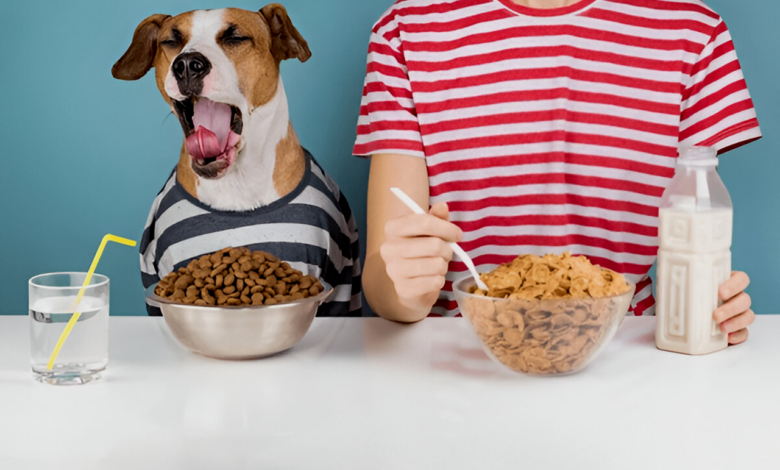
Can Pets Eat Human Food? Safe & Dangerous Foods Explained
pets eat human food? Discover dangerous human foods for pets in this comprehensive guide. Keep your furry friends healthy and happy!
When it comes to sharing our meals with our furry friends, the question “Can pets eat human food?” is one that every pet owner has pondered. While some human foods can be a healthy addition to your pet’s diet, others can be extremely dangerous, even life-threatening. Understanding which foods are safe and which are harmful is crucial for ensuring the well-being of your beloved companion. This article delves into the intricacies of feeding human food to pets, exploring safe options, dangerous foods to avoid, and the reasons behind these dietary restrictions. By the end, you’ll have a comprehensive guide to making informed decisions about what to share with your pet.
In conclusion, while it’s tempting to share our meals with our pets, it’s essential to be mindful of their unique dietary needs and restrictions. Some human foods can provide nutritional benefits, but others pose serious health risks. By understanding which foods are safe and which are dangerous, you can ensure your pet stays healthy and happy. Always consult your veterinarian before introducing new foods into your pet’s diet, and remember that moderation is key. With the right knowledge and precautions, you can enjoy sharing occasional treats with your furry friend without compromising their health.
Can Pets Eat Human Food? Safe & Dangerous Foods Explained
Pets are often considered part of the family, and it’s natural to want to share our food with them. However, not all human foods are safe for animals. While some can be a nutritious supplement to their diet, others can cause severe health issues or even be fatal. This article provides a detailed exploration of the human foods that are safe for pets, those that are dangerous, and the reasons behind these distinctions.
Safe Human Foods for Pets
Lean Meats: Cooked, unseasoned lean meats like chicken, turkey, and beef are generally safe for pets. They are an excellent source of protein, which is essential for muscle development and overall health. However, it’s important to remove any bones, fat, or skin, as these can cause digestive issues or pose a choking hazard.
Vegetables: Many vegetables are safe and healthy for pets. Carrots, green beans, and cucumbers are low in calories and high in vitamins and fiber, making them great snacks. However, avoid onions, garlic, and mushrooms, as these can be toxic.
Fruits: Some fruits, such as apples (without seeds), blueberries, and bananas, can be a tasty and nutritious treat for pets. These fruits are rich in antioxidants, vitamins, and fiber. Always remove seeds, pits, and cores, as they can contain harmful substances.
Dairy in Moderation: Small amounts of plain yogurt or cheese can be safe for some pets, especially those that aren’t lactose intolerant. Dairy products can provide calcium and probiotics, but excessive consumption can lead to digestive upset.
Grains: Cooked rice, oatmeal, and quinoa are safe for pets and can be a good source of carbohydrates. These grains are often recommended for pets with sensitive stomachs or as part of a bland diet during recovery from illness.
Dangerous Human Foods for Pets
Chocolate: Chocolate contains theobromine and caffeine, which are toxic to pets. Even small amounts can cause vomiting, diarrhea, increased heart rate, seizures, and in severe cases, death. Dark chocolate and baking chocolate are particularly dangerous due to their high theobromine content.
Grapes and Raisins: Grapes and raisins can cause kidney failure in dogs and cats. The exact toxic substance is unknown, but even small quantities can be harmful. Symptoms include vomiting, lethargy, and decreased appetite.
Onions and Garlic: These vegetables contain compounds that can damage red blood cells in pets, leading to anemia. Symptoms may not appear immediately but can include weakness, vomiting, and breathing difficulties.
Xylitol: This artificial sweetener, commonly found in sugar-free gum, candy, and some peanut butter brands, is highly toxic to pets. It can cause a rapid release of insulin, leading to hypoglycemia (low blood sugar), seizures, and liver failure.
Alcohol: Alcohol is extremely dangerous for pets, even in small amounts. It can cause vomiting, diarrhea, difficulty breathing, tremors, and in severe cases, coma or death.
Caffeine: Found in coffee, tea, energy drinks, and certain medications, caffeine can overstimulate a pet’s nervous system, leading to restlessness, rapid breathing, heart palpitations, and muscle tremors.
Avocado: Avocado contains persin, a substance that can cause vomiting and diarrhea in pets. The pit also poses a choking hazard and can cause intestinal blockages.
Nuts: Macadamia nuts are particularly toxic to dogs, causing weakness, vomiting, and hyperthermia. Other nuts, like almonds and walnuts, can cause digestive issues and pose a choking hazard.
Why Some Human Foods Are Dangerous for Pets
The digestive systems of pets are different from those of humans. Certain foods that are harmless or even beneficial to us can be toxic to animals. For example, theobromine in chocolate is metabolized slowly in pets, leading to a buildup of toxic levels in their system. Similarly, the compounds in onions and garlic can cause oxidative damage to red blood cells, which humans can tolerate but pets cannot.
Additionally, pets have different nutritional requirements. While humans can process a variety of foods, pets need a balanced diet tailored to their species. Feeding them inappropriate foods can lead to nutritional imbalances, obesity, and other health issues.
How to Safely Share Human Food with Pets
If you want to share human food with your pet, follow these guidelines:
Consult Your Veterinarian: Before introducing any new food into your pet’s diet, consult your veterinarian. They can provide personalized advice based on your pet’s age, breed, and health status.
Moderation is Key: Even safe foods should be given in moderation. Treats should make up no more than 10% of your pet’s daily caloric intake.
Avoid Seasonings and Additives: Many human foods contain salt, sugar, spices, and artificial additives that can be harmful to pets. Always offer plain, unseasoned versions of safe foods.
Monitor for Allergies: Just like humans, pets can have food allergies. Introduce new foods gradually and watch for signs of an allergic reaction, such as itching, swelling, or digestive upset.
Educate Yourself: Stay informed about which foods are safe and which are dangerous. Keep a list of toxic foods handy, and ensure all family members are aware of the risks.
Read More: Raw vs. Kibble: What’s the Best Diet for Your Pet?
Conclusion
In conclusion, while the idea of sharing human food with pets can be a gesture of love and bonding, it is essential to approach it with caution and knowledge. Not all human foods are created equal when it comes to pet safety, and what may be harmless or even beneficial for us can be harmful or even fatal for our furry companions. By understanding which foods are safe and which are dangerous, pet owners can make informed decisions that prioritize their pet’s health and well-being. Always remember that moderation is key, and consulting a veterinarian before introducing new foods into your pet’s diet is a responsible step to ensure their safety.
Ultimately, the health and happiness of our pets depend on the choices we make for them. While it’s tempting to share our meals with them, their dietary needs are different from ours, and certain foods can have severe consequences. By staying informed, avoiding harmful foods, and offering safe alternatives in moderation, we can show our love for our pets in a way that keeps them healthy and thriving. Responsible pet ownership means being mindful of their unique needs, and with the right knowledge, we can enjoy many happy and healthy years with our beloved companions.
FAQs
Can dogs eat peanut butter?
Yes, dogs can eat peanut butter, but it should be unsalted and free of xylitol, a toxic sweetener. Always check the ingredients before sharing.
Is it safe for cats to drink milk?
While cats may enjoy milk, many are lactose intolerant. Small amounts of lactose-free milk or plain yogurt are safer options.
Can pets eat eggs?
Yes, cooked eggs are safe for pets and provide a good source of protein. Avoid raw eggs due to the risk of salmonella.
Are bananas safe for pets?
Yes, bananas are safe for pets in moderation. They are high in potassium and fiber but also contain sugar, so limit the amount.
Why is chocolate dangerous for pets?
Chocolate contains theobromine and caffeine, which pets cannot metabolize effectively. These substances can cause toxicity, leading to serious health issues.







